Digital Peripheries: The Online Circulation of Audiovisual Content from the Small Market Perspective » książka
topmenu
Digital Peripheries: The Online Circulation of Audiovisual Content from the Small Market Perspective
ISBN-13: 9783030448523 / Angielski / Miękka / 2020 / 302 str.
Digital Peripheries: The Online Circulation of Audiovisual Content from the Small Market Perspective
ISBN-13: 9783030448523 / Angielski / Miękka / 2020 / 302 str.
cena 164,01
(netto: 156,20 VAT: 5%)
Najniższa cena z 30 dni: 154,18
(netto: 156,20 VAT: 5%)
Najniższa cena z 30 dni: 154,18
Termin realizacji zamówienia:
ok. 16-18 dni roboczych.
ok. 16-18 dni roboczych.
Darmowa dostawa!
Kategorie:
Kategorie BISAC:
Wydawca:
Springer
Język:
Angielski
ISBN-13:
9783030448523
Rok wydania:
2020
Wydanie:
2020
Numer serii:
001087168
Ilość stron:
302
Waga:
0.44 kg
Wymiary:
23.39 x 15.6 x 1.68
Oprawa:
Miękka
Wolumenów:
01
Dodatkowe informacje:
Wydanie ilustrowane











